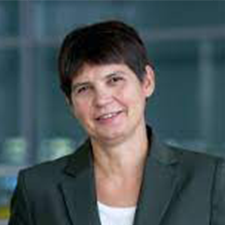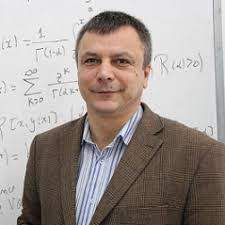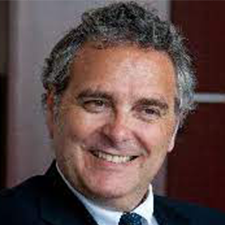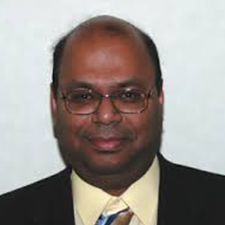 Prof. Dr. Dorota Mozyrska
|
Prof. Dr. Dorota Mozyrska - Bialystok University of Technology, Poland
Monday, 27th June 2022, 11:00 am - 11:30 am
Dorota Mozyrska is an employee of the Department of Mathematics at the Faculty of Computer Science of the Bialystok University of Technology. She graduated in 1992 at the Branch of the University of Warsaw in Białystok, majoring in mathematics. Doctorate in mathematical sciences awarded in 2002 by the Council of the Faculty of Mathematics and Information Sciences of the Warsaw University of Technology. The habilitation degree in the field of automatics and robotics was awarded by the resolution of the Council of the Faculty of Electronics and Information Technology of the Warsaw University of Technology on September 23, 2014. Research interests: mathematical control theory, difference and differential calculus of fractional order, population dynamics. She is a co-author of about 107 publications. Dorota Mozyrska conducted or conducts classes in the following subjects: mathematics, basics of mathematics, applications of mathematics in environmental engineering, linear algebra, differential equations, mathematical analysis, mathematical statistics, probability calculus, descriptive statistics, econometrics, operations research, English-language courses under the Erasmus program and as visiting professor at African University of Science and Technology: mathematical statistics, advanced linear algebra, differential equations with Matlab, fractional calculus. He belongs to the associations: Polish Mathematical Society and the International Society of Difference Equations. Private interests (without priority order): bicycle, mountains, travels, movies, yoga, logical and board games, cats, poetry, music, social media, minerals, Biebrza and Bialowieza Forest, popularization of exact sciences, especially mathematics.
Title: Fractional-variable-order digital controller design tuned with the chaotic yellow saddle goatfish algorithm for the AVR system
|
 Prof. Dr. Antonio Liotta
|
Prof. Dr. Antonio Liotta - Free University of Bozen-Bolzano, Italy
Monday, 27th June 2022, 11:30 am - 12:00 pm
Antonio Liotta (https://bit.ly/UniBzLiotta) is Full Professor at the Faculty of Computer Science, Free University of Bolzano (Italy), where he teaches Data Science and Machine Learning. Antonio’s passion for artificial intelligence, has driven his academic career through the meanders of artificial vision, e-health, intelligent networks and intelligent systems. Antonio’s team is renowned for his contributions to micro-edge intelligence and miniaturized machine learning, which have significant potential in harnessing data-intensive systems, for instance in the context of smart cities, cyber-physical systems, Internet of Things, smart energy, and machine learning with humans in the loop. He has led the international team that has recently made a breakthrough in artificial neural networks, initiating a new research strand on “sparse neural networks for embedded learning” (doi.org/10.1038/s41467-018-04316-3). Antonio was the founding director of the Data Science Research Centre at the University of Derby. He has set up several cross-border virtual teams, and has been credited with over 350 publications involving, overall, more than 150 co-authors. Antonio is Editor-in-Chief of the Springer Internet of Things book series (springer.com/series/11636), and associate editor of several prestigious journals. He is co-author of the books “Networks for Pervasive Services: six ways to upgrade the Internet” (springer.com/gp/book/9789400714724) and “Data Science and Internet of Things” (springer.com/gp/book/9783030671969).
Title: Data Analysis for the Intelligent Internet of Things
|
 Prof. Dr. Maslina Darus
|
Prof. Dr. Maslina Darus - Universiti Kebangsaan Malaysia, Selangor, Malaysia
Monday, 27th June 2022, 12:30 pm - 13:00 pm
Prof. Dr. Maslina Darus (Universiti Kebangsaan Malaysia, Selangor, Malaysia) - Maslina Darus obtained her first degree in Mathematics from Acadia University, Nova Scotia in 1992. She obtained her PhD from University of Wales, Swansea, U. K. in 1996. She became a lecturer at Universiti Kebangsaan Malaysia and was promoted as Associate Professor in 2001. She was promoted to Full Professor in September 2006. She was appointed as Head of Mathematics programme from 2004-2009. Then from 2010 until 2013, she was the Chair of the School of Mathematical Sciences and later as Deputy Dean, Undergraduate & Alumni of Faculty of Science and Technology (2013-2018). She is very active in the Malaysian Mathematical Sciences Society (PERSAMA) and served as the Honorary Secretary for about 17 years (1997-2013). Currently, she is the President of the Malaysian Mathematical Sciences Society (PERSAMA), 2013-2023. Her interests in geometric function theory mainly focus on the properties of certain subclasses of univalent functions. She has graduated more than 30 PhD students. The results from her researches have indeed been published in more than 700 articles in various refereed/indexed journals. She has collaborated with many mathematicians throughout the globe. Title: Generalized Differential Operators: Is constructing new operators worth it?
|
 Prof. Dr. Dumitru Băleanu
|
Prof. Dr. Dumitru Băleanu - Cankaya University, Ankara, Turkey
Tuesday, 28th June 2022, 09:30 am - 10:00 am
Dr. Dumitru Băleanu was born December 4, 1964 in Romania. He completed his undergraduate at Craiova University, Faculty of Science, Physics Department in 1988. Dr. Dumitru Baleanu got the PhD in Physics in 1996 from the Institute of Atomic Physics, Romania. Since 2000, he is been a visiting staff member at the Department of Mathematics, Faculty of Arts and Sciences, Çankaya University, Ankara, Turkey since 2000. He is a professor at the Institute of Space Sciences from Magurele-Bucharest, Romania.His fields of interest include the fractional dynamics and its applications in science and engineering, fractional differential equations and their applications, discrete mathematics, control theory, mathematical physics, solitons theory, Lie symmetry, dynamic systems on time scales, the wavelet method and its applications, quantization of systems with constraints, the Hamilton-Jacobi formalism, geometries admitting generic and non-generic symmetries. He is an editorial board member of several prestigious international journals as Applied Numerical Mathematics, Mathematics, Symmetry, Mathematical Methods in Applied Sciences, Advances in Difference Equations, Advances in Mechanical Engineering, Open Physics, Journal of Computational and Nonlinear Dynamics and Fractional Calculus and Applied Analysis. He is the chief editor of Frontiers in Physics-section Mathematical Physics and Progress in Fractional Differentiation and Applications. His h-index is 56 and he has been a highly cited researcher in Mathematics since 2015. He co-authored several published books in World Scientific Publishing, Academic Press, Springer and De Gruyter. He got several international prizes as Obada Prize (2019), ICFDA2018 Award: Innovation in Fractional Calculus and ICFDA 2016 Award: Dissemination Award. Title: Fractional Generalised Operators:Theory and Applications
|
 Prof. Dr. Carlo Cattani
|
Prof. Dr. Carlo Cattani - University of Tuscia, Viterbo, Italy
Tuesday, 28th June 2022, 10:00 am - 10:30 am
Carlo Cattani is Professor (Habil. Full Professor, since 2017) of Mathematical Physics and Applied Mathematics at the Department of Economics, Engineering, Society and Enterprise (DEIM) of Tuscia University (VT)-Italy, since 2015. He has been previously appointed as professor/research fellow at the Dept. of Mathematics University of Rome “La Sapienza” (1980-2004) and Dept. of Mathematics, University of Salerno (2004-2015). Research fellow at the Italian Council of Research, CNR in 1978-1980 and Visiting Research fellow at the Physics Institute of the Stockholm University (1987-1988). His main scientific research interests is focussing on numerical and computational methods, mathematical models and methods, time series and data analysis, computer methods and simulations. Author of more than 300 scientific papers on international journals and co-author of several books he has given significant contributions to fundamental topics such as numerical methods, dynamical systems, fractional calculus, fractals, wavelets, nonlinear waves, data analysis, neural networks and artificial intelligence. Editor in Chief of the journals “Fractal and Fractional” and “Information Sciences Letters”, he is serving also as Editor in Several International Scientific Journals. He has been awarded Honorary professor at the Azerbaijan University (2019), at the BSP University, Ufa-Russia (2009) for “his contribution in research and international cooperation”, and (in 2018) as adjunct Professor at the Ton Duc Thang University – HCMC Vietnam. For the many achievements in research (H-index: Scopus (43, WoS (36), Google Scholar (48)) he has been listed in the 2020 World Ranking of Scientists (Top 2%), ranking 85th (2nd in Italy) for numerical and computational mathematics, and 16th over 335 Italian Mathematicians of this list. The complete list of publications (1990-2022) can be found at the following web link:
Title: Haar Wavelet Fractional Derivative
|
 Prof. Dr. David Naccache
|
Prof. Dr. David Naccache - École Normale Supérieure, Paris, France
Tuesday, 28th June 2022, 10:30 am - 11:00 am
Prof. Dr. David Naccache was born on February 21, 1967 in Beer Sheva, Israel. David Naccache is a professor at ENS and a member of the ENS’ Computer science department. Degree in Engineering, University Paris II, 1990. Master of Science in Theoretical Computer Science, University Paris VI, 1990. Doctor of Philosophy in Cryptology, National Superior School Telecommunications, 1995. Habilitation to Supervise Research, University Paris VII, 2004. He has published over 200 articles in cryptography and information security and is the inventor or co-inventor of 180 patent families. His main research areas are fast implementations, embedded security (smart cards), the detection of security loopholes and public-key cryptography. He is a forensic expert by the Court of Appeal of Paris and formerly by the International Criminal Court (The Hague). David currently serves in the editorial boards of 4 security journals and is an IACR fellow. Title: On the security of Internet encryption standards
|
 Prof. Dr. Anjan Biswas
|
Prof. Dr. Anjan Biswas - Alabama A&M University, USA
Tuesday, 28th June 2022, 11:30 am - 12:00 pm
Dr. Anjan Biswas earned his B.Sc (Honors) in Mathematics from St. Xavier’s College, Calcutta, India. Subsequently, he completed his M.Sc and M. Phil degrees in Applied Mathematics from the University of Calcutta. Moving further along, he received MA and Ph.D. degrees in Applied Mathematics from the University of New Mexico in Albuquerque, NM, USA. Thereafter, he was a post-doctoral researcher at the University of Colorado, Boulder, CO. Currently, he works as a faculty member in Mathematics at Alabama A&M University that is in Normal, AL, USA. His current research interest is in Mathematical Photonics. In particular, he focuses on pulse propagation dynamics through optical fibers across trans-oceanic and trans-continental distances. He concentrates on soliton perturbation theory, soliton polarization, quasi—stationary solitons, quasi—particle theory, variational principle as well as semi—inverse variational principle and Lie symmetry analysis that are all applicable to the study of soliton dynamics. Title: Quasi-Stationary Optical Gaussons
|
 Prof. Dr. Ravi P. Agarwal
|
Prof. Dr. Ravi P. Agarwal - Texas A&M University, Kingsville, USA
Tuesday, 28th June 2022, 12:00 pm - 12:30 pm
Dr. Ravi P. Agarwal was born in Moradabad (India) in 1947. In 1973, he earned his Ph.D. (Mathematics) at the Indian Institute of Technology in Madras, India, one of the highest ranking universities in India. His major research interests include Numerical Analysis, Differential and Difference Equations, Inequalities, and Fixed Point Theorems. He has published 45 research monographs and more than 1700 publications in prestigious national and international mathematics journals. Dr. Agarwal worked previously either as a regular faculty or as a visiting professor and scientist in universities in several countries, including India, Germany, Italy, Canada, Australia, USA, Singapore, and Japan. He has been ranked as a Highly Cited Researcher for 14 consecutive years, and has also been recognized as one of the "World's Most Influential Scientific Minds" in 2014 and 2015 by Thomas Reuters/Clarivate Analytics. In 2020 he has been listed among world's Top 2% Scientists by Stanford University. According to Google Scholar, Dr. Agarwal is cited more than 40000 times, and on MathSciNet, his work is cited more than 16000 times by 6400 scientists. Dr. Agarwal is the recipient of several notable honors and awards, including 8 Doctor Honoris Causa and Professor Honoris Causa. He was also nominated as a possible candidate for a Banco Bilbao Vizcaya Argentaria (BBVA) Foundation Frontiers of Knowledge Award, an international award scheme recognizing significant contributions in the areas of scientific research and cultural creation. He has served over 40 Journals in the capacity of an Editor/Honorary Editor, or Associate Editor, and published 20 books as an editor. Title: Existence and uniqueness results for a nonlinear integral equation related to infectious disease
|
